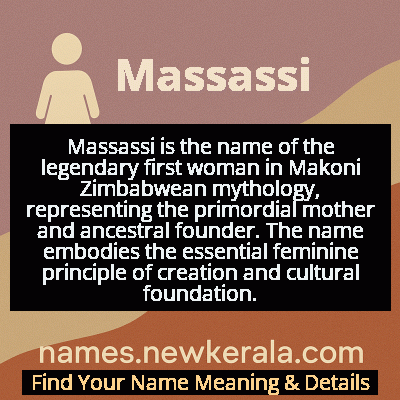Massassi Name Meaning & Details
Origin, Popularity, Numerology Analysis & Name Meaning of Massassi
Discover the origin, meaning, and cultural significance of the name MASSASSI. Delve into its historical roots and explore the lasting impact it has had on communities and traditions.
Name
Massassi
Gender
Female
Origin
African
Lucky Number
1
Meaning of the Name - Massassi
Massassi is the name of the legendary first woman in Makoni Zimbabwean mythology, representing the primordial mother and ancestral founder. The name embodies the essential feminine principle of creation and cultural foundation.
Massassi - Complete Numerology Analysis
Your Numerology Number
Based on Pythagorean Numerology System
Ruling Planet
Sun
Positive Nature
Leaders, ambitious, highly driven, self-reliant, innovative.
Negative Traits
Overly aggressive, domineering, impatient, selfish.
Lucky Colours
Red, orange, gold.
Lucky Days
Sunday.
Lucky Stones
Ruby, garnet.
Harmony Numbers
2, 3, 9.
Best Suited Professions
Entrepreneurs, managers, engineers.
What People Like About You
Courage, determination, leadership.
Famous People Named Massassi
Massassi Moyo
Traditional Healer and Cultural Preservationist
Revived traditional Makoni healing practices and established cultural education programs
Massassi Chidzonga
Community Leader and Educator
Founded women's cooperative movements in rural Zimbabwe and promoted girls' education
Massassi Marufu
Environmental Activist
Led reforestation projects in Manicaland province and traditional land conservation efforts
Massassi Tembo
Storyteller and Oral Historian
Preserved and recorded Makoni creation stories and ancestral traditions
Name Variations & International Equivalents
Click on blue names to explore their detailed meanings. Gray names with will be available soon.
Cultural & Historical Significance
As the first woman, Massassi established the matrilineal traditions that characterize many Zimbabwean cultures, teaching her descendants the sacred rituals of birth, marriage, and ancestral veneration. Her legacy is particularly celebrated during women's initiation ceremonies and seasonal festivals, where her wisdom is invoked to guide new generations. The name carries the weight of ancestral responsibility and serves as a living connection to the foundational principles of Makoni identity and cultural continuity.
The cultural importance of Massassi extends beyond mythology into contemporary social structures, where her name continues to inspire women's leadership and cultural preservation. In many Makoni communities, naming a daughter Massassi is considered both an honor and a responsibility, linking the child to the ancestral mother's virtues of wisdom, strength, and community stewardship.
Extended Personality Analysis
Women named Massassi are traditionally believed to embody the pioneering spirit and nurturing wisdom of their legendary namesake. They often display strong leadership qualities combined with deep empathy, making them natural community builders and caretakers of tradition. Their personality is characterized by a profound connection to their roots and a sense of responsibility toward preserving cultural heritage, often serving as bridges between generations.
These individuals typically exhibit remarkable resilience and practical wisdom, approaching challenges with the same innovative spirit attributed to the first woman. They are known for their ability to create harmony in diverse situations while maintaining strong personal boundaries and cultural identity. The name suggests someone who balances traditional values with progressive thinking, often becoming pillars of their communities while quietly influencing positive change through example and guidance.
In interpersonal relationships, Massassi-named individuals are often described as deeply intuitive and spiritually grounded. They possess a natural authority that commands respect without being authoritarian, and they frequently become confidantes and advisors within their social circles. Their strength lies in their ability to honor tradition while adapting to modern circumstances, making them effective agents of cultural continuity and positive evolution.
Modern Usage & Popularity
In contemporary Zimbabwe, Massassi remains a culturally significant name primarily used within Makoni communities and among families seeking to honor their ancestral heritage. While not among the most common names nationally, it has experienced a revival in recent decades as part of cultural reclamation movements. The name is particularly favored by educated urban families who wish to maintain strong connections to their rural roots and traditional values. Modern bearers often shorten it to 'Massa' or 'Sassi' in informal settings while preserving the full name for official and ceremonial purposes. The name's usage reflects a growing appreciation for indigenous knowledge systems and a rejection of colonial naming conventions, positioning Massassi as a symbol of cultural pride and feminist reclamation of ancestral feminine power.
Symbolic & Spiritual Meanings
Massassi symbolizes the primordial feminine energy that gives life, sustains community, and preserves wisdom across generations. Metaphorically, the name represents the river of cultural continuity—flowing from ancient origins to nourish contemporary existence. It embodies the concept of 'ubuntu' (I am because we are) through its connection to collective identity and shared ancestry. The name also carries symbolic associations with fertility, both literal and creative, representing the capacity to bring forth new life, ideas, and cultural expressions while maintaining essential traditions.
Beyond its literal meaning, Massassi serves as a symbolic bridge between the physical and spiritual worlds, between past and present, and between individual identity and collective consciousness. It represents the enduring power of oral tradition and the living presence of ancestors in daily life. The name evokes images of sacred groves, flowing waters, and the eternal cycle of life—reminding bearers of their role as temporary custodians of traditions that will flow onward to future generations.

